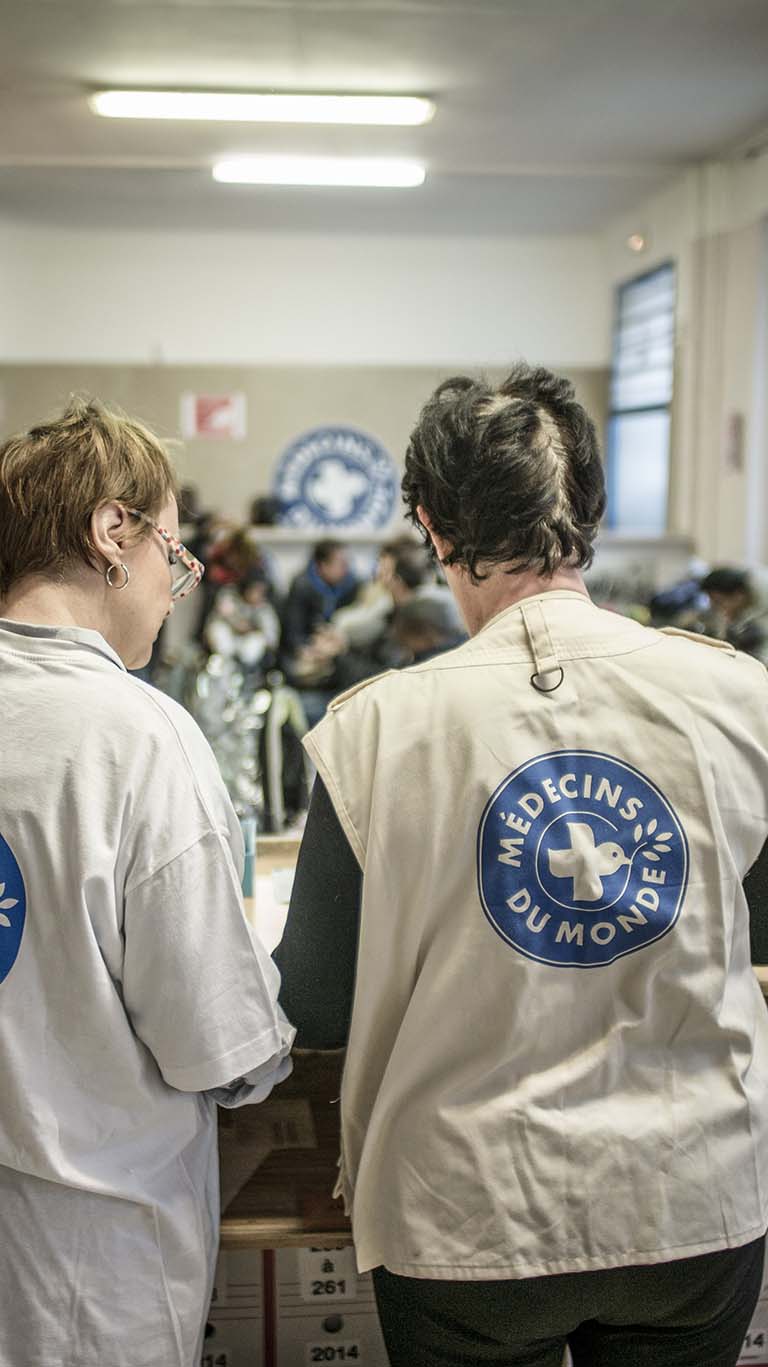HOWEVER, AS THE 300 ORGANISATIONS WHICH SIGNED THE MANIFESTO FOR A MORE HUMAN PUBLIC SERVICE HIGHLIGHTED, THE PRINCIPLE OF EQUAL ACCESS TO PUBLIC SERVICES SHOULD BE GUARANTEED:

Access to health rights and care
© Olivier Papegnies
Médecins du Monde began developing its treatment, prevention and social support systems with the most vulnerable people in France in 1986. Employees and volunteers, doctors, nurses, social workers, health mediators, psychologists, psychiatrists and all those committed to defending access to healthcare for all support people in situations of vulnerability, helping them to overcome the obstacles that they encounter to enjoying their rights and access to mainstream healthcare.
Social and regional inequalities in terms of access to high-quality care are increasing, as the COVID pandemic made all too clear. Every day, our mobile outreach teams and reception, treatment support and orientation centres bear witness to the fact that the lack of healthcare coverage and the cost of care are ever growing barriers to accessing healthcare. And these rights are being reduced for the most vulnerable people, particularly since the end of 2019 and the adoption of highly restrictive measures on the rights of foreign nationals to access healthcare.
The procedures for claiming rights to universal coverage, AME for people without residence papers or health insurance, and the solidarity health top-up insurance for those in a regular situation, are increasingly complex, including for social, medical and medical-social professionals, who find it increasingly difficult to provide appropriate support.
In addition, there is the obstacle of domiciliation (required for the vast majority of people supported by our teams who do not have a stable address) and that of digitalised public services where staffed desks are replaced by paying phone numbers or internet platforms which are inaccessible to people who are in difficulty, those who are not French-speaking, the elderly, vulnerable people, etc.
The healthcare reform of 2019, established in the midst of the health crisis in 2020 (see video below), continues to wreak havoc, from delays to denial of care, as witnessed by our teams. Everything seems to be gradually heading towards foreigners in a precarious situation being further removed from the healthcare system.
In France, Médecins du Monde receives and supports those who are the furthest from the healthcare system, through its healthcare and orientation centres, and its outreach work in mainland France and overseas.
Teams work on a daily basis on two fronts in combination with a number of partners: access to rights (information, support with applications, mediation with institutions), and access to healthcare and prevention (medical and paramedical consultations, guidance and support as soon as possible to mainstream healthcare and prevention facilities).
Every year, the observatory for access to health rights and care, which was created within the Médecins du Monde programmes in France in 2000, documents and analyses the experiences of the Médecins du Monde teams with regards to people’s state of health and the dysfunctions in access to healthcare and rights. It is based on witness accounts and information collected from all projects by the field teams, by making observations around access to healthcare and existing difficulties and monitoring legal provisions and regulations. It is a tool which draws attention to vulnerable populations who are often overlooked in public statistics.
Based on these observations in the field and these analyses, throughout the year Médecins du Monde conducts advocacy work on the local, regional and national levels, in partnership with various partners, NGOs, institutions, academic organisations and learned societies. Médecins du Monde defends the rights of vulnerable people to access mainstream healthcare systems.
More particularly, Médecins du Monde advocates for:
- The development of truly protective health coverage which is universal and accessible to anyone in France regardless of their administrative situation;
- Strengthening appropriate healthcare and preventive mechanisms for anyone in a vulnerable situation (access to interpreting services, healthcare mediation) and ensuring referrals to existing mainstream services for all.
This will be made possible in part by finally organising the merger of the AME within the health insurance.











